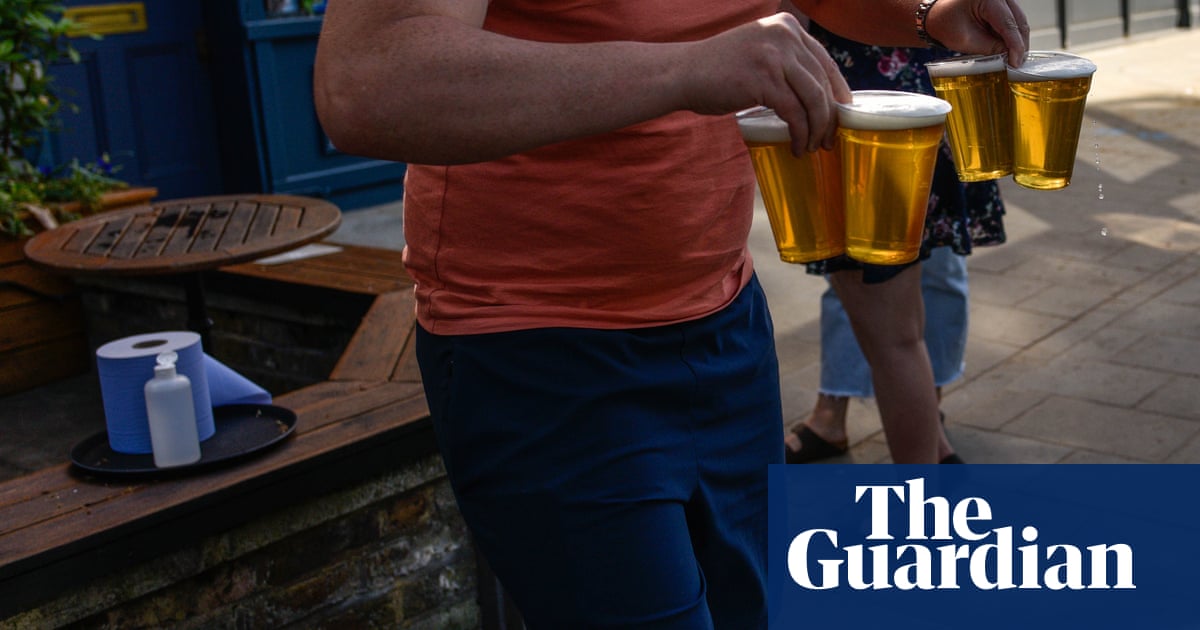
Customers in England may be asked to check in as they arrive at pubs and restaurants, under plans for reopening the hospitality sector that will be confirmed to MPs on Tuesday by the prime minister.
Decisions on relaxing the 2-metre distancing rule and reopening hospitality on 4 July are expected to be rubber-stamped at a meeting of the government’s Covid-19 committee on Monday.
As well as ministers, the meeting will be attended by the chief medical officer for England, Chris Whitty, and the chief scientific adviser, Patrick Vallance. Johnson will then consult with his cabinet on Tuesday before announcing details of the “easements” in the House of Commons.
Appearing on Sophy Ridge on Sunday on SkyNews, the health secretary confirmed that the government intended to go ahead in line with Boris Johnson’s roadmap, published last month.
“In that plan, it states that on around 4 July we will take further measures if it is safe to do so. We talk about hospitality and outdoor hospitality in those plans,” he said. “We are clearly on track for that plan.”
Asked about reports that ministers were considering plans to ask diners and drinkers to register as they enter a venue, he said: “I wouldn’t rule that out. There are other countries in the world that take that approach.”
In New Zealand, the public use their phones to scan codes as they go into hospitality outlets to build up a “digital diary” of where they have been, so that if a new case emerges, anyone who has been at the same outlet can be contacted easily.
However, with the UK’s contact-tracing app already a month overdue and now not expected until autumn, Hancock also suggested that the government might opt for a more low-tech approach, simply requiring venues to collect their customers’ contact details.
Johnson commissioned a review of the 2m distancing rule under intense pressure from the hospitality industry, which has warned that many businesses would be rendered unprofitable if it has to be adhered to rigidly even after they are allowed to reopen.
Carried out by the No 10 permanent secretary, Simon Case, the review has considered scientific advice but also the economic impacts.
Case is expected to conclude that the blanket 2-metre restriction can be lifted and replaced with a “1-metre plus” approach that would allow the public to be closer together if other safety precautions are taken.
Asked about that idea, Hancock said: “That is the sort of thing we’re looking at to how do you make it safe to open things – and as safe as possible, to open as much as possible.
“Things like wearing a face mask, which reduces the transmission, clearly, how the seating is arranged – because face-to-face is much more dangerous than back-to-back, and there’s much more transmission than side-to-side.”
Asked whether hairdressers would be included in the reopening plans, Hancock said: “A lot of the country does need a haircut. We need to do that in a safe way.”
However, a group of independent scientists warned that it was not safe to relax distancing rules for indoor settings and that any proposal to reduce to 1 metre would “effectively end” social distancing as people would interpret the change as a return to normal. BAME communities and low-paid workers would be placed at greatest risk, the group known as Independent Sage said, as a higher proportion would be unable to work from home and would be most exposed to the virus.
Sir David King, a former chief scientific adviser and chair of the group, said: “The rate of infection is still far too high to consider this even with mitigating measures. There are more than 1,000 new cases a day and still no functioning tracing system. It is vital that the government releases the evidence it has used to make this decision.”
Downing Street sources rejected the idea that 4 July should be dubbed “independence day”, stressing that the latest changes could be the first to be reversed if the number of cases rises again.
“The reason we are able to move forward this week is because the vast majority of people have taken steps to contain the virus. The more we open up, the more important it is that everyone follows the social distancing rules,” said a No 10 spokesperson. “We will not hesitate to put the handbrake on to stop the virus running out of control.”
Meanwhile, the chancellor is preparing a mini-budget, expected to include measures to stimulate consumer demand and encourage job creation, in the teeth of what he has conceded may be a deep recession.
Hancock declined to comment on reports that Rishi Sunak was considering an emergency cut in VAT. “That is absolutely a matter for a budget, and you wouldn’t expect me to comment either way on any speculation,” he said. “But the broader point is true, which is that the economy has taken a terrible hit, and we need to get it back on its feet and give people the confidence to get out there.”
A VAT cut would echo a decision made by the former chancellor Alistair Darling as the economy slid into recession during the global financial crisis in late 2008. Whitehall sources suggested the Treasury remained sceptical about whether such a move represents good value for money – but confirmed that it was under consideration, in a bid to boost confidence.
The shadow health secretary, Jon Ashworth, suggested Labour would back the lifting of the 2-metre rule if other safety measures were brought in.
“Yes, under certain circumstances, but we also need to see a greater use of face masks, I would have thought. For certain staff, workers, who are public facing in their day-to-day action, a greater use of face shielding, let’s get track-and-trace up and running.
“This still remains a deadly virus; we cannot be complacent, so if we are going to relax some measures, we need to make sure other mitigation measures are in place.”












